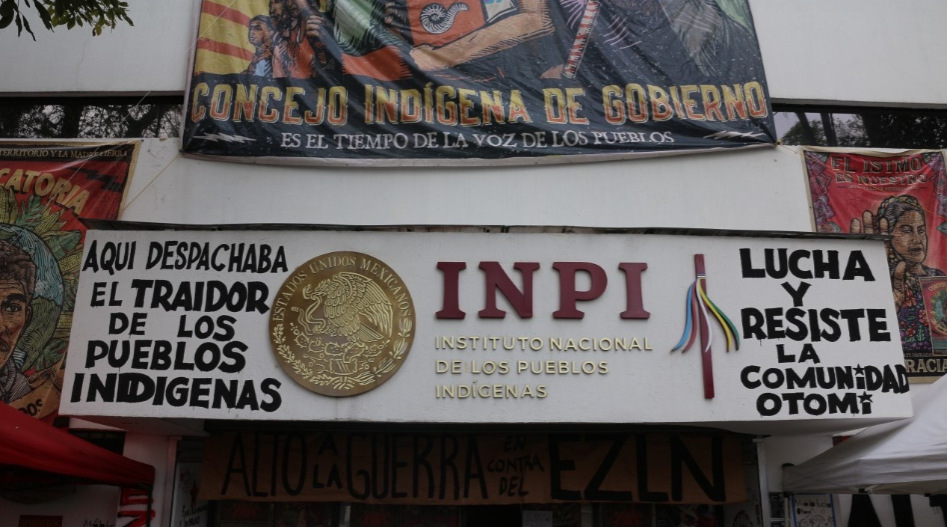
Photo borrowed from It’s Going Down.
By Luis Hernandez Navarro
At the height of the pandemic, the Pilares Dam began to be filled. The community of Chorijoa, in the ejido Guarijíos-Burapaco, was flooded. Their land, fruit trees, fences, native vegetation, and medicinal plants are disappearing under water. As the reservoir fills up, the ancestral territory of the Makurawe tribe is lost.
The Pilares Dam was built on the Mayo River, in Alamos, Sonora, over 10 years, in Guaraní territory. Only recognized as a people in 1986, they were never consulted if they wanted it or not, or if they agreed with it. Much less was it explained to them what the consequences of building it would be. They simply built it on their territory. Nor did they warn them that their land would be flooded. Without a single consideation, they flooded it. They didn’t care that the indigenous people were legally protected. They went over their heads (https://bit.ly/34R3XPc).
The tragedy of the guarijíos, indigenous poor among the poor, displaced from their lands and territory by a dam, is far from being an exception in indigenous Mexico today. Throughout the country, in the name of progress, energy sovereignty, or well-being, various mega-projects are devouring the ancestral habitats of the indigenous communities. With no more counterweight than community resistance and a few legal tools, those who promote large projects ignore the rights of the people to be consulted, plunder their natural resources, contaminate and steal their waters, expel them from their lands, devastate flora and fauna, and murder their defenders.
Theoretically it shouldn’t be this way. Time and again, President López Obrador has claimed the heritage of the native peoples. The indigenous question is at the center of his agenda. From the inauguration in the Zócalo to the tour entitled “Dialogue with the Indigenous Peoples,” which included visits to 100 communities throughout Mexico, the issue is at the heart of his government’s project.
“I am going,” he announced as he gave the starting signal for his tour of 100 communities, “to visit all the indigenous regions of Mexico. I am going to meet with the members of all the ethnic groups and all the original cultures of our country. […] I want to go and talk to them to see how the programs that have been implemented to benefit Indigenous communities are going, because they are being given priority, special attention, but I want to hear their points of view and also gather other feelings. In part, the tour sought to undo the injunctions filed by the communities against dozens of infrastructure projects.
However, despite this declaration of intent, the balance of the relationship between indigenous peoples and 4T does not allow for optimism. After two years of a new government, the indigenous peoples do not have recognition of the rights that have been pending since the signing of the San Andres Accords in February 1996, nor do they have a budget for their development projects, nor effective defense of their human rights (from Samir Flores to Oscar Eyraud Adams, at least 30 human rights defenders have been murdered during this six-year period), nor respect for their territories.
To attend to the ethnic groups, the new government promoted the formation of the National Institute of Indigenous Peoples (INPI) just three days after López Obrador took office. To head the new institution, he named professionals from native communities. Unfortunately, despite the origin of its directors, the INPI reproduced, without further ado, the rancid vices of state indigenism of previous governments. At best, it brought to the indigenous world the same social policies implemented to combat poverty in other sectors of the population.
In these two years, the INPI has facilitated consultations to endorse mega-projects, which are far from what is established in Convention 169 of the International Labour Organisation. It has recreated the stale paternalistic assistance and clientelist policies of the old regime. Although it declares that another constitutional reform on indigenous rights and culture is needed, it does not take a single step in this direction. It accepts, without a comment, the drastic reduction of its budget (40 percent). It remains ominously silent in the face of the assassination of dozens of indigenous leaders. It does not say a single word about the paramilitarization of large Indian areas in the country. And it closes its eyes to the corporate plundering of the territories.
As if that weren’t enough, as a result of the lack of information and timely measures by the State to address the Covid-19 pandemic, many indigenous communities could be on the verge of disaster, as the disease will exacerbate problems and inequalities among these peoples (https://bit.ly/2GHjBEK).
Far from resolving the promise of solving their ancestral demands and building a new deal between the State and indigenous communities, the 4T has launched an offensive against the territories and self-determination of native peoples. As is the case with the Pilares Dam and so many other projects, the issue is not to ask for a hypothetical pardon for what happened 500 years ago, but to stop the plundering, dispossession, exploitation and discrimination that indigenous peoples experience today.
This article was originally published in Spanish in La Jornada on October 13th, 2020. https://www.jornada.com.mx/2020/10/13/opinion/017a1pol This English interpretation was published by Schools for Chiapas.
